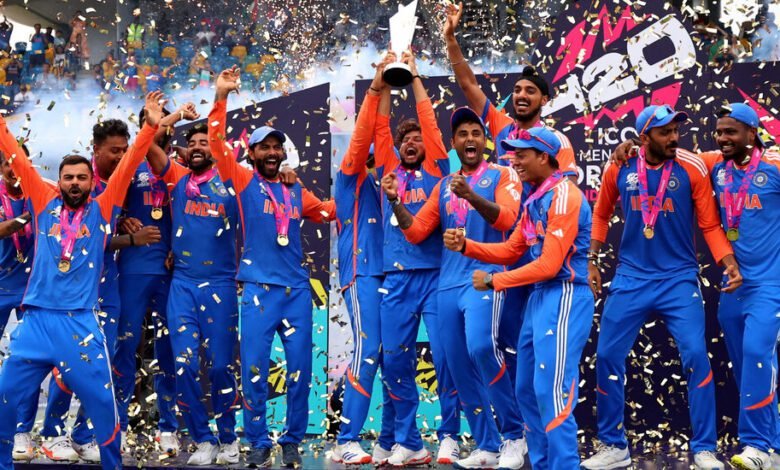India wins T20 Cricket World Cup, sealing its dominance in the sport

India won the men’s Cricket World Cup on Saturday, defeating South Africa and ending a drought in tournament victories that lasted more than a decade, even as the country dominated the sport globally by other measures such as talent, money and influence.
The tournament was played across several Caribbean islands, with some matches hosted in the United States, including at a pop-up stadium in New York. When the final in Barbados ended with India declared champions, it was close to midnight at home, where jubilant crowds took to the streets of several cities.
“Maybe in a few hours it will sink in, but it’s a great feeling,” said India captain Rohit Sharma, who toured the stadium with his daughter on his shoulder to thank the crowd. “To cross the line – it’s great for everyone.”
It was a hard-fought and deeply emotional match for India, in part because many of their most experienced players, including Sharma, 37, were near the end of their careers. India last won the World Cup in T20, the shortest format of cricket, in 2007, when Sharma was just starting out. The top prize also eluded 35-year-old Virat Kohli, one of cricket’s most recognized icons. India coach Rahul Dravid had never won a World Cup during his long and illustrious playing career.
All three men ended the evening on a happy note, with both Sharma and Kohli announcing their retirement from the fast, short pace of the game. Dravid, who has ended his stint as India coach, is normally a calm, stoic presence. But after the victory he was screaming and celebrating.
India’s President Draupadi Murmu and Prime Minister Narendra Modi congratulated the team. “On the field, you won the World Cup. But in the villages, streets and communities of India, you have won the hearts of our countrymen,” Mr. Modi said in a video message.
Cricket, followed by hundreds of millions of people, is a crucial part of India’s global brand — perhaps even more important than the country’s film industry. India’s cricket governing body has sometimes been accused of using its outsized economic clout to dictate terms around global cricket events, reflecting its status as the richest contributor and a destination for the world’s best players.
The launch of the Indian Premier League in 2007 transformed a sport that had previously been seen as slow-moving and cash-strapped. In just 17 years, the league’s brand value has surpassed $10 billion, making it one of the richest sports leagues in the world. Players routinely earn contracts worth more than $1 million for a season that lasts about eight weeks, with some of the highest-paid earning close to $3 million.
Last year, India launched the IPL’s sister league, the Women’s Premier League, with $500 million — a similar investment to that which launched the men’s league — and it is already expanding opportunities for women in India and for talent from around the world. The richness of the league has meant more investment at the grassroots level to develop more female players. Players who have long been overlooked in the men’s game are now finding brand endorsements, more viewers and thousands of people attending their matches in stadiums.
And the foreign players in both leagues — all with huge followings at home — are a public relations boost for India as they travel to play, using social media to post admiration for the culture of a hugely diverse country.
In India, a cricket-mad nation that closely monitors every move of its players on and off the field, many of this generation of stars have been role models who could help the country move forward on social issues, especially in a public life that remains male-dominated.
Sharma, the captain, who is married to a sports management professional, and Kohli, who is married to an actor, often talk about their partners’ roles in their careers. Sharma’s wife Ritika Sajdeh and his daughter are often by his side during outings, while Kohli is often seen video calling his family from the stadium after matches.
“Our daughter’s biggest worry was if all the players had someone to hug them after seeing them crying on TV,” Kohli’s wife Anushka Sharma posted on social media after the win.
Jasprit Bumrah, named the World Cup’s most valuable player, gave a post-award interview with his wife, radio host Sanjana Ganesan. This was a working couple on tour. Behind them, amid the celebrations, was their 10-month-old baby being cared for in a stroller.
“Thank you so much for talking to us, Jasprit, and all the best to—” Ms. Ganesan began as she wrapped up the interview. But her husband went in for a hug before she finished speaking and then ran back to join his teammates in celebrating.



